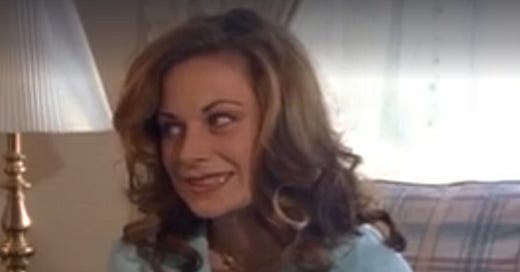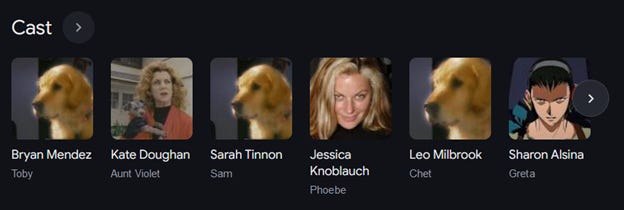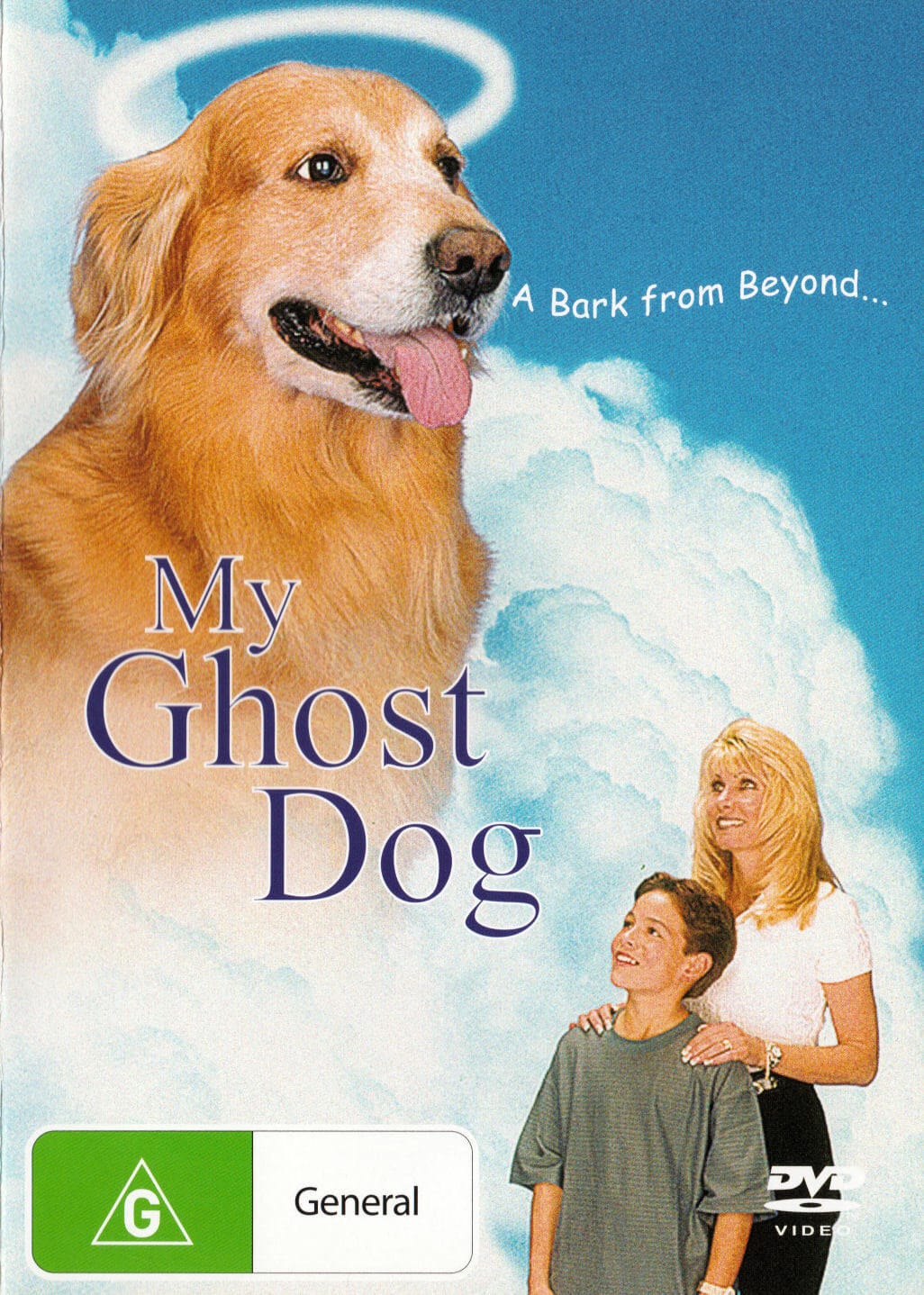Content warning: Ghost dog.
This film begins with a discrepancy. In some corners of the Internet, this film is called My Ghost Dog. It has a tagline indicative of such a title: “A bark from beyond…” (classic). It has a poster that warms the cockles of the film freak’s heart. But when you boot up the ol’ Tubi machine, the film is called My Magic Dog. The IMDb page calls the film My Ghost Dog, but the poster there has the title My Magic Dog in wacky lettering (an objectively bad poster compared to the one we’ve provided below).
Immediately, I was met with a dilemma. Is this movie about a ghost dog, or a magic dog? If this film doesn’t live up to the promise of its (superior) poster – i.e., if it doesn’t have a dead dog that comes back to the land of the living – then this film probably won’t be the delicious trash romp that I was expecting.
Intrepid as I am, I continued along the Ghost/Magic Dog journey, and it did not take long for my hopes to be restored. It occurs with the first lines of dialogue, as a matter of fact. If you can call them that. Three characters talk over each other immediately, so it is not immediately clear what is being said in the first place. One might call it Altman-esque if it wasn’t so jumbled and expository. And when you break down the language, it doesn’t get any clearer.
The child’s name is Toby, we can glean that. And he is this woman’s next door neighbor. “Hi, I’m Toby. I’m your next door neighbor.” Got it. But as he says this, a mover interrupts him and asks the woman, “Where do you want this?”
“Oh,” the woman says. “That goes in the Asian room.”
I’m sorry, huh?
I feel like these nonsensical movies are showing how naïve I am as a human being, as they very easily gaslight me into thinking absolutely insane things might be real. I legitimately watched this opening sequence about five times (it looks dreadful by the way; why is the wide shot so…wide?), then I Googled “Asian room” to make sure that this wasn’t a well-known thing in the 1990s that I simply don’t understand. All I got were suspect webpages about how to decorate your home to look “Asian” or have an “Asian vibe.” So anyway… “Asian room” is not a thing, and yet another movie has made me feel really stupid for even entertaining such a thought.
This opening is about the most normal thing My Ghost Dog has to offer, so I suppose we should strap in.
Toby is living with his stepfather Chet, and it has been two years since his mother’s passing. This fact is introduced to us by way of Chet asking Toby to smash open a lockbox with a baseball bat. Inside of this lockbox is his mother’s will (he is so so so excited to see his mother’s will!). In it, his mother details that Toby should live with Chet in the event of her death (which happened two years prior, lest we forget).
So immediately…more questions. Where has this will been in the intervening two years? Seemingly just in Chet’s garage in a lockbox, which he has only now discovered. Where has this child been living for the last two years? It initially seems as though he has been living with his Aunt Violet, but she quickly shows up to inform Toby of an upcoming custody hearing that may result in him starting to live with her. If Chet is his stepfather, what happened to his biological father? This introduction to this father-son relationship and the court battle that will be the driving force of the film’s conflict beg questions that the scene (and much of the film) don’t care to address. Literally, the only important thing in this scene is the knowledge that Toby’s dead mother’s will is in the lockbox, and that this MacGuffin is the key to Chet winning custody.
The romantic subplot of this movie is mostly stupid sitcom-level shenanigans, but it is useful to outline it briefly, I suppose. Chet meets his new neighbor Phoebe while she is rifling through his trash, stealing his discarded belongings. He is too busy to care about this, though, as he must run off to a “work emergency” at the local television station. Phoebe agrees to babysit for Toby, and she fumbles over every single one of her words, utterly flustered by Chet’s existence. Chet, meanwhile, is led to believe that Phoebe has a husband named Herman, because she never clarifies that Herman is a bird. And this nonsense bit goes on for ever. She says things like, “oh, that won’t ruffle his feathers,” and Chet doesn’t get the joke…because Phoebe never said that Herman was a bird. It’s all lazy screenwriter shorthand to excuse why two single people wouldn’t immediately start shtuping as soon as they meet on-screen.
This doesn’t stop Toby, however, who instantly sees in Phoebe a person that his stepfather can and should have sex with. This sounds weird, but that is what is literally written into the script. I am merely dictating the plot here; don’t shoot the messenger. When Phoebe runs out to inform Toby that she will be babysitting him later (despite the fact that his father has already left, so she should really be babysitting him at that very moment…), then waves and runs away like a six-year-old who got Big-ed into a grown person’s body, this exchange happens between Toby and his friend Sam:
Toby: She’s cuter than Jill.
Sam: Don’t you think she’s a little old for you?
Toby: Yeah, but not for my dad.
Sam: Now you’re thinking!
*High five!*
Phoebe is a shining light of this film. Her character doesn’t feel like something that exists in the human world. In fact, she occasionally reacts to everyday things as if she is experiencing them for the first time, and her response is to short circuit a little bit. At one point, Toby calls her “the bomb,” and she makes this weird grimace and kinda looks off camera. And it almost feels like a mistake, like the actress breaks character. But we hold on the reaction shot for a while. It is difficult to understand what exactly she is reacting to, and with what emotion.
The film goes through almost 30 minutes of setup before arriving at the inciting incident that the title promises. For the dog to become either a ghost or magic, he must be hit by a car. These are simply the rules of cinema. We all know this.
It is initially a kind of brutal scene when thinking about it from the perspective of, say, a 6-year-old (i.e., the intended audience of this G-rated film). We see the dog lying and whimpering in the middle of the street, and Toby runs out to hold the animal as it breathes its last breaths. This would be a heart-wrenching scene, if it were not for all of the other things that happen in said scene. This includes the police officer who casually rolls up, gets out of the car, and asks the young boy (as he holds his dying pet in his arms) if he could give a description of the two men that just burgled his home. (The cop also later in the scene shoots off a look like he’s entirely over this whole dying dog thing, like he’s just bored to be there). Then there is the giant halo effect that rises up above the dog, and we watch as the dog’s soul (in magical gold fairy dust form) lifts off into heaven. It’s a real subtle touch.
Not long after this, Toby is visited by the spirit of his dead dog in the night. He finds this exciting, if we are to believe the script: “Ghost dog, cool,” he says, with almost no inflection. The specifics of this still come off as unsettling, I imagine, for the film’s target demo. The dog discusses how he did not feel anything when he died, but that he was glad that Toby was there to “help him cross over.” It’s all just so material and real…too real for what is billed as a pleasant children’s film.
Nobody but Toby can see the ghost of Lucky, but Toby often talks to him, which makes him look like a lunatic to his friends and family. He also seems to forget that other people can’t see Lucky, so he’ll say things like, “oh, yeah, Lucky’s back. Oh, wait…” Essentially, the film makes our protagonist look like a total idiot.
This includes when Toby and Lucky work overtime to try and get his father laid. Toby places an ad in the classifieds, and when a suitor calls, he lies to his father so Chet believes the date is actually a parent-teacher conference. The date goes expectedly poorly, as we are told by Russ Tamblyn’s (West Side Story, Twin Peaks) stereotypically Italian waiter: “Your dad, he don’t a-look too happy!” That’s the exact line. The character is about as egregious a stereotype as Aunty Donna’s “Pizza Man” character.
Not everything in this film is unintentionally funny. There are moments that show some form of creative juice. The villainous Aunt Violet is often shown in extremely wide, canted angles; in one scene, the camera shoots her straight on, then at her line’s most dramatic moment, it slowly moves to a canted angle. That’s a good visual gag.
There is a scene in which Chet and Phoebe finally go on a date, and they awkwardly talk about weather. Which is an age-old bit that shows how poorly everything is going, but Phoebe, again, sells it by being weirdly ecstatic about how nice the weather is. In that same sequence, we also get the disgruntled waiter who answers the question of what do two people talk about on a date with “the ever-widening socioeconomic chasm that exists between the classes in this country.” These are decent bits! (Also, when this last joke results in Chet asking Phoebe if she wants some “social chasm” for dessert, the genuine horror and sickness illustrated in her face is insane).
And then there’s the delightful Pasta Talk, the fake TV show briefly featured, which is basically another Aunty Donna bit (or maybe those boys just talk about pasta a lot, and I’m just free associating).
Eventually, the A-plot revolving the custody battle rears its ugly head again. Aunt Violet’s evil plot to steal Toby away by swiping the real will and replacing it with a forgery appears like it is going to succeed. It is up to Lucky the magical ghost dog to (pretty randomly) recover the stolen will and rightfully confirm Chet’s legal right to Toby’s guardianship. This occurs in a prolonged 10-minute sequence involving most of our principal characters bickering in a driveway while Lucky runs to the spot where the will is buried. Luckily we get some snappy camera moves to give this otherwise static stand-off some intensity. The canted angles return in full force, and we get a hilarious crash zoom on Toby’s face reacting to Aunt Violet’s pure villainy.
The police (or, really, the one police officer this town seems to have) are called onto the scene when Chet, Phoebe, and Toby’s friend blockade Aunt Violet’s care. It’s a real ticking clock scenario, as the ghost dog digs around in the park for the metal case containing the will, racing to find the buried treasure before Chet is arrested (for…something). In the nick of time, Lucky returns with the file box, which just floats toward the group seemingly of its own volition. This freaks everyone out for a second, but then they’re pretty cool with it once the will is in Chet’s hands. Violet is arrested for masterminding the robbery, and Toby and Chet win the day. It’s all pretty boilerplate plotting with minimal payoff, to be completely honest. At least the coda has a genuinely sweet moment between Toby and Lucky, before Lucky is whisked away to doggie heaven on a shimmering golden laser.
It is important to note that sometimes bleeding eye films are made by Looney Tunes people. It takes a special person to make a film that comes off like it was made by an alien who observed human activities for a week then bought a cheap camera at Radioshack. My Ghost Dog doesn’t quite meet the high standard of a 5-out-of-5 eye bleeder, because it is too normal from a production standpoint (despite all the strangeness in its acting, dialogue, plotting, premise, poster, tagline, and title).
It may be worthwhile to mention, in relation to this, that the film’s director, John Putch, appears to be a normal film industry professional. The son of Jean Stapleton, Putch has acted in a number of films and television, and he has directed multiple films. None of those films appear to be masterpieces, but he has a general filmmaking competency that prevents My Ghost Dog from being utter gibberish.
That said, the film does give us little moments of paratextual joy:
Anyways…ghosts aren’t real … at least, not how such a being is usually depicted in media … if ghosts are those creatures existing in that liminal space between life and death, then we are talking not about sheet white translucent humanoids hovering about, working to complete the task that will finally spirit them away (literally) to the great beyond … we are talking about the slithering kind … to conceive of these things floating is ludicrous … no, they slink and slide along the floor … they prefer to stay out of sight, which yes is akin to your “ghost” image, but … have you seen these sliders? They don’t— They don’t stop, man … the floors teem with slitherers and sliders wriggling and writhing in that plasmatic muck which lowers the viscosity between the two planes … I can’t touch the muck, but it helps them move … and they move so … quickly. So quickly.
At Bleeding Eye Cinema, we don’t rate movies based on their artistic merits. We rate them based on strangeness, on a scale from Colin Hanks1 to full-on, run-to-the-eyewash-station Eye Bleeder.
My Ghost Dog rates as: Grape Jelly Smearer (2/5)
Colin Hanks is the true cinematic touchstone of milquetoast normieness – no offense, Colin.











